“Ties of Blood and Water”
Written by Edmund Newton & Robbin L. Slocum and Robert Hewitt Wolfe
Directed by Avery Brooks
Season 5, Episode 19
Production episode 40510-517
Original air date: April 14, 1997
Stardate: 50712.5
Station log: Kira, Worf, and Dax welcome Tekeny Ghemor back to the station. With the Dominion having absorbed Cardassia, and with Ghemor’s history with the dissident movement that overthrew Central Command, he’s the best choice to lead the opposition to the new Dominion government. Unfortunately, Ghemor can’t do it because he’s terminally ill. He’s accepted that he’ll never see his daughter again (Kira says Bajoran Security is still looking for Iliana, but they haven’t found her yet), and he can’t lead a Cardassian government in exile. Bashir confirms the diagnosis, and has some treatments that might help, though nothing that will cure him.
Dukat contacts Sisko, demanding that Ghemor be returned to them. Since the Federation doesn’t recognize the current Cardassian government, and there are no extradition treaties between Cardassia and either the Federation or Bajor, Sisko smiles and says that Dukat shouldn’t get his hopes up before hanging up on him.
Kira brings Ghemor—her surrogate father figure—to meet Kirayoshi—Kira’s sorta-kinda-surrogate son. He also reveals that Kira’s life is kind of public knowledge, which rather surprises her.
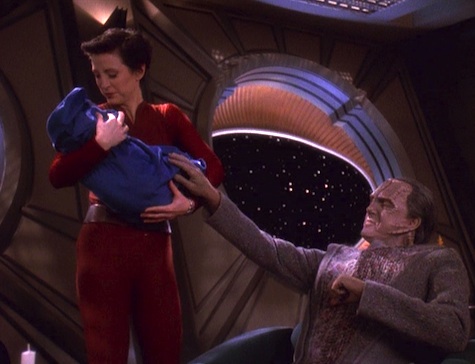
Ghemor also wants to indulge in a Cardassian ritual where a dying person reveals secrets to a family member. Kira’s the only family he has at this point and he wants to talk to her. Kira goes to Sisko, who says this is a great opportunity, and Kira admits that it is, but she doesn’t want the responsibility.
Ghemor is deteriorating. He’s in the 24th-century equivalent of hospice care, on a biobed that will administer painkillers if things get too bad. Ghemor starts telling Kira about Dukat’s enemies, and a lot more beyond that. He apparently knows every politician on Cardassia.
As Kira sits with Ghemor, she flashes back to her father dying when she was in the resistance (thus giving us the chance to see Nana Visitor in the world’s most unconvincing wig). He was badly hurt by the Cardassians, and he begs her not to leave him alone in his pain.
Dukat arrives in a Jem’Hadar battleship, armed and ready, asking for Sisko’s decision regarding Ghemor. He beams aboard the station with the Vorta Weyoun. To Sisko’s surprise, Ghemor has been cleared of all charges by the Dominion. Dukat only wants to bring him home so he can have a proper Cardassian funeral.
Ghemor himself is less than interested, even after Dukat offers to tell Ghemor where Iliana is. He won’t deal with the Dominion under any circumstances.
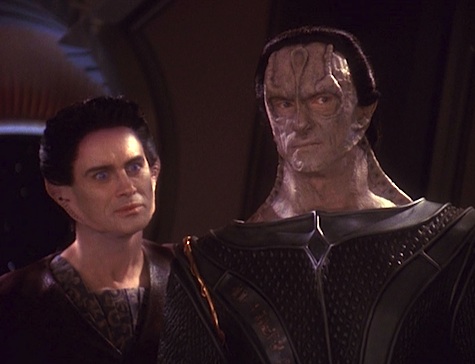
Over the next few days, Kira listens to Ghemor and doesn’t get a lot of sleep. Dukat then comes to Kira with Ghemor’s official military record, which includes being at the Kissia Monastery when it was destroyed. Kira becomes snippy with Ghemor, furious that he kept his past from her. Ghemor admits to everything, and that the Cardassians were monsters, but Kira doesn’t want to hear it.
After Weyoun wins at dabo, to Dukat’s annoyance, Sisko offers to share a drink with Dukat and Weyoun. The bottle of kanar he offers to share turns out to have been delivered to Ghemor, laced with poison—which explains why Dukat won’t drink it.
Odo asks why Kira is being so pissy now. It’s not like Ghemor’s military record was a secret. Kira doesn’t have a good answer, but she does have another flashback: when Furel announces that they found who shot her father, she leaves Taban’s bedside to take revenge against the Cardassians who shot him rather than fulfill her promise to stay by his side.
In the present, Bashir informs Kira that Ghemor won’t live out the hour and he wants to see her—but she doesn’t want to see him. Bashir says that no matter what he did in the past, he shouldn’t die alone.
That prompts one last flashback: Kira got back from the raid only to find that her father died while she was gone, calling her name. She orders up another raiding party and digs a grave for Taban near a tree.
Kira finally decides to sit with Ghemor until he dies. After Ghemor dies, she tells Bashir about his final minutes, and admits that she should’ve been there for Taban’s death, but she couldn’t stand to see the strong man she’d admired deteriorating like that.
Dukat and Weyoun petition Sisko for Ghemor’s body for burial on Cardassia, where Dukat will reveal to the people of Cardassia that he had a last-minute change of heart on his death bed, embracing Cardassia’s new position as part of the Dominion with his dying breath.
Sisko, however, says that Ghemor’s funeral arrangements have already been taken care of. On Bajor, Kira buries him next to her own father.
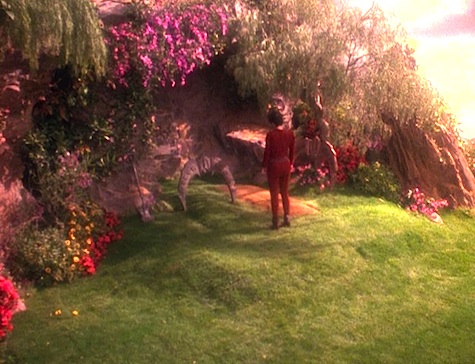
Don’t ask my opinion next time: Kira—who is finally back in her regular uniform, instead of the maternal one she’s been wearing since the end of “The Begotten”—also wears the bracelet that Ghemor gave her at the end of “Second Skin” for the first time. We also learn the fate of her father.
The slug in your belly: Dax fills Worf in on the events of “Second Skin,” which handily does so for the viewers as well.
There is no honor in being pummeled: Worf is shocked to see Kira all friendly with a Cardassian—even giving him a hug!—and Dax points out that he should’ve known her five years earlier. She wouldn’t have believed that she could love anybody.
Preservation of matter and energy is for wimps: Odo reminds Kira that Ghemor’s military service is a matter of public record, and she could have found out the information Dukat provided any time she wanted to.
Rules of Acquisition: Quark sees that Kira looks like crap, and when she says “whatever” to his offer of a drink, he surprisingly goes the compassionate route and brings her a warm milk that will help her sleep.
For Cardassia! Dukat has retained the title of “gul” rather than something higher-ranking, like “legate.” Dukat also insists that Cardassia retains autonomy, belied by Weyoun following him all over the station and the fact that Ghemor is cleared by Dominion jurisprudence, not Cardassian (which never clears anyone).
Victory is life: The Vorta are cloned and, like the Jem’Hadar, are genetically engineered. Among other things, they are immune to most poisons, which Weyoun says is a handy thing for a diplomat.
Keep your ears open: “Still calling yourself ‘gul’? I’m surprised you haven’t promoted yourself back to legate by now.”
“I prefer the title ‘gul.’ So much more hands-on than ‘legate.’ And less pretentious than the other alternatives: ‘president,’ ‘emperor,’ ‘first minister’—‘emissary’.”
“How about ‘Dominion puppet’?”
Sisko and Dukat taking the piss out of each other.
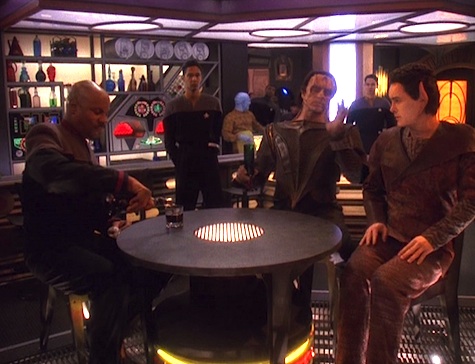
Welcome aboard: Both Lawrence Pressman and Jeffrey Combs make return appearances as Ghemor and Weyoun, respectively, the latter establishing his second recurring role of the series (in addition to Brunt). William Lucking also returns as Furel in the flashbacks, while Marc Alaimo returns as Dukat in the present.
Finally, Thomas Kopache plays his fifth of seven Trek roles as Taban. He previously appeared on TNG (“The Next Phase” and “Emergence”) and Voyager (“The Thaw”), as well as in Star Trek Generations. He’ll appear again as Taban in “Wrongs Darker than Death or Night,” and also show up twice in two different roles on Enterprise (in “Broken Bow” and “Harbinger”).
Trivial matters: This episode establishes that the Vorta are cloned, which was mostly done so they could have Jeffrey Combs recur as Weyoun despite being disintegrated at the end of “To the Death.” (It also retroactively makes Omet’iklan’s disintegration of Weyoun somewhat less impressive. Less an act of defiance and more an act of “the hell with it, they’ll make another one.”)
This episode also establishes what was implied in “By Inferno’s Light,” that Dukat is now the Cardassian governor of Dominion-occupied Cardassia (though Dukat himself doesn’t quite see it that way).
The novel Fearful Symmetry by Olivia Woods establishes that Dukat does, in fact, know Iliana Ghemor’s location, though given how he treats her in that novel’s flashbacks, it’s unlikely he was sincere in his offer to reveal that location to her father.
We see the background of how the Dominion solidified power in Cardassia between “By Inferno’s Light” and this episode in Una McCormack’s novel The Never-Ending Sacrifice.
Walk with the Prophets: “I like games.” On the one hand, this hits pretty much every deathbed story beat pretty predictably. There aren’t any real surprises here, and the episode doesn’t really have a climax as such. Kira remembers not being there for her father’s death, she goes to sit with Ghemor, who then dies off-camera, and then Kira bares her soul to Bashir.
And that’s the main symptom of why the episode still works: Nana Visitor knocks it out of the park. The scene at the end where she confesses everything to Bashir in much the same way Ghemor confessed to her over the previous week is beautifully done, mostly as a one-take closeup. This is a beautifully directed episode by Avery Brooks, as we get some excellent use of closeups, and of shot composition, particularly in how it arranges people in twos: Dukat and Weyoun, the latter hovering around the former, making his presence known but also making it clear that he’s above it all; Kira and Ghemor in various poses of relative comfort that become less and less so for both of them as the episode wears on, until Kira all but collapses on Ghemor’s chest at the end; Kira and her father, the former hovering over the latter but also like a coiled spring, wanting to leap away at any moment, finally taking it when Furel offers a possibility for violence.
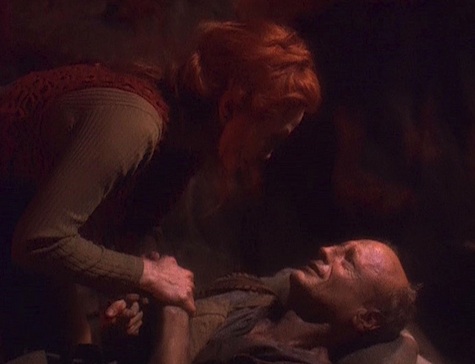
And again we come back to the shades of gray that make the show so wonderful. As I’ve said before, nobody involved in the Cardassian occupation of Bajor was clean—not Kira, whose only possible response to her father’s death is not to grieve but to go out and commit even more violence, and not Ghemor, who participated in the burning of a monastery as a young officer on Bajor. Certainly Dukat isn’t clean, and he’s so eager to shut Ghemor up and get him home that he risks a very obvious kanar poisoning just so his secrets from those days won’t be revealed and jeopardize his position.
This is the first look at the Weyoun/Cardassian-in-charge dynamic that we’ll see a lot of for the rest of the series, first with Weyoun and Dukat and later with Weyoun and Damar, and what’s particularly fascinating about the former here is that there’s such an obvious difference between their two approaches to all of this. Dukat has everything invested in this—he wants to restore Cardassia to its former glory, going so far as to keep the title he had during Cardassia’s glory days, and insisting on Cardassia’s autonomy even as a Jem’Hadar stands behind him on his shiny new battleship and Weyoun’s there to keep an eye on him. For his part, Weyoun seems to just be enjoying himself, but also doesn’t seem to give all that much of a damn. The intrigue and plotting is an intellectual curiosity at best, but doesn’t really have a helluva lot to do with anything important. Being cloned isn’t the only reason why Weyoun is always left standing…
Warp factor rating: 6
Keith R.A. DeCandido will be the guest speaker at the July meeting of the Philadelphia Science Fiction Society this coming Friday at the 9pm at the International House at 3710 Chestnut Street in the City of Brotherly Love. Keith will have books for sale (including The Klingon Art of War), and there will be an informal dinner at a local eatery afterward that all are welcome to join. Keith also has a new Kickstarter going for a new story in the Dragon Precinct universe; details here.










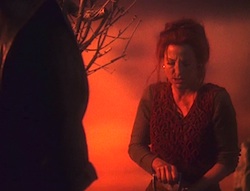
I pretty much agree with this assessment – I could predict pretty much the entire plot after the first 10-15 minutes. Doesn’t mean it wasn’t enjoyable to watch, sometimes tropes are tropes for a reason. And of course, good acting and characterization can definitely make a difference between a trope-y story being good or bad.
This episode felt twice as long as it really was. There was never a time watching it where I wasn’t some degree of bored.
Best part of the episode to me was, the Cardassian concept of the deathbed revealing of your enemies’ secrets so that your friends could get revenge upon them in the future. Neat idea and very Cardassian.
This episode kind of reminded me of “Progress” from Season 1 only that episode rocked. I grew more attached to the farmer in that story than I ever did for Kira’s father or Ghemor.
Even though I’ve seen this episode a dozen times, I only just now realized that Ziyal is also on the station, which would potentially be the first chance Dukat and Zyial would have to see and talk to eachother since he left her to die on the station after Inferno’s Light. Potential missed opportunity to add in another father/daughter story and maybe spice the episode up a bit more.
Its sad that Ghemor dies here; I wish we could have seen more of him, particularly during the Dominion War. But still I enjoyed the episode, particularly since a commenter was kind enough to post some scenes from The Never-Ending Sacrifice in a previous rewatch, which really puts the start of Dominion-occupied Cardassia into perspective. I kept picturing those scenes as I watched this.
Nana Visitor is compelling as always here. I remember being a bit disappointed when Kira started being pissy with Ghemor. As stated, his military record was never a secret, and in any case the man was dying. I was relieved when Kira went back to Ghemor’s side, being there for Ghemor where she wasn’t there for her own father, Taban.
I see Dukat’s keeping the title of gul as comparable to (and possibly inspired by) many real dictators keeping the title colonel. Ghadaffi comes to mind, and it seems to me there were at least a couple of others. Dukat never goes in for overly elaborate uniforms as compensation, though.
I felt this was a weak one, a forced effort to recapture past glories. It was a disappointing followup to “Second Skin,” killing off Tekeny and continuing to leave the Iliana thread dangling, and it was kind of implausible how close Kira felt to Tekeny given the brevity of their interaction years earlier.
Come to think of it, I don’t think I was really happy with any of the Kira-centric episodes in the last three years of the series, at least none that I can think of offhand. Nothing against Kira herself or Nana Visitor, I just didn’t like the way the writers seemed to keep putting her in these contrived melodramatic situations in unsuccessful attempts to equal the power of some of her earlier episodes like “Duet” and “Second Skin.”
A 6? To me, this scores at least 8, if not higher.
Ties of Blood and Water works on multiple levels to me. I can’t think of a better scene where Kira snaps at Ghemor for losing control of his bodily functions. Not only it shows Kira’s inability to accept Ghemor’s past, but it also hits at a very real issue, which is taking care of the elderly. Both the script and the actors nail this issue.
I don’t see it as melodramatic. If anything, this episode to me is a dramatic conclusion to both Second Skin and Duet, and Robert nailed the ending. Four years prior to this episode, she began to learn and accept that not all Cardassians were killers. Second Skin pushed it further by giving her a father figure. Burying Ghemor next to her father’s grave is the perfect visual conclusion of this particular character journey.
And of course, it’s Bashir of all people who talks some serious sense into the Major. Back in the pilot, you’d never imagine such a scene taking place. To me, that’s five years of character development.
And on the plot side, although bringing back Weyoun cheapens his demise on To the Death, it does set up a terrific dynamic with the Cardassians. Season 5 really was a pivotal year, in which it set up a lot of major threads that would propel the last two seasons.
I love the concept of shri’tal – it just seems such a perfectly Cardassian thing to do.
I also love how, in retrospect, that is clearly what Enabrain Tain does with Garak in “In Purgatory’s Shadow.” Tain waited for Garak, the only person left in the galaxy that he could conceivably consider himself ‘close’ to – so that he could divulge his last secrets and things left unsaid. And then, once that’s done, he dies. I think it’s entirely possible that Tain started his whole rewire-the-life-support-into-a-transmitter plan with that very conclusion in mind. He knew he was dying, he knew he had to do shri’tal before he died, so he went about contacting the only person he could think of who was worthy of it.
I have to agree with @2 here. I though this episode took a rather neat idea, but executed it in an altogether dull way. The reason for Ghemor being on the station in the first place was rather contrived (really, they were just going to spring “we want you to lead the resistance” on him without sounding him out in any way first?) and once they got into the main plot, while I agree that Nana Visitor’s performance was spot on, the script was just way too by-the-book. And the flashbacks became irritating because it was obvious where they were going from the start and I found myself wanting them to just get to the point already.
On the other hand, the one thing I did love about this episode was the totally gleeful performance by Jeffrey Combs. The episode really sparked into life every time Wayoun appeared on screen, swanning around the station not giving an “airbourne intercourse” (really, thanks for that one Krad) about what was going on, and just having an absolute whale of a time. The point where he drinks the poison and admires how toxic it is was the highlight of the episode for me.
This is the first episode where the Dominion really feels like an integrated part of the Trek universe, a presence that will no longer disappear for episodes at a time. And for me, Jeffrey Combs’ performance as Weyoun sells the real appeal of the Dominion as villains from this point forward. Can’t wait for the moments ahead.
The part that never worked for me was Weyoun talking about “the mysterious plot, the veiled threats, the subtle innuendo”. Avery Brooks insists on chewing, swallowing and regurgitating every scene he’s ever in. There’s absolutely no subtley or nunance to it at all. In most Star Trek episodes there never is. People talk about Trek being more “intellectual” than Star Wars, but I’ve always found ithat claim hogwash because the writers insisted on spelling out things they could have implied instead.
Any episode where Kira gets all sanctimonious ends up turning me off because she’s admittedly intentionally killed innocents as a Bajoran terrorist. Her goal was defensible, of course. Her methods were not. So her getting all uppity because Ghemor’s not as white as snow makes me want to puke. That said, I’m glad Bashir was there to convince her to reconcile before it was too late.
I’m surprised no one had anything to say about Kira throwing the cup at Dukat, missing his head by inches. I love the way that Dukat still thinks he’s in control of the situation even in the face of that outburst. Is Nana Visitor’s wig more fake than the one she wore in Necessary Evil? The script spells it as the Kiessa monastery. 8: yeah, some of Krad’s ratings are a bit miserly, even when the review is gushing with praise.
I liked this episode, as it gives Kira more scren time again, other than being a furure mom/”guest mom”. She trusted Ghemor so much she never bothered to look up his public record. In the end, I think she was more angry at herself than she was at Ghemor.
At least Bashir was able to keep her from making the same mistake again.
I’m starting to see that every time I’m tempted to skip a DS9 episode, it’s all the more reason I need to re-watch it. This was one of Weyoun’s best episodes, if not the best. Jeffery Combs was fantastic here – his gulping of the kanar and that little look he gives Dukat at the end of the scene as if he hoping for more fascinating drama is just hilarious.
Lockdown rewatch. I think I liked this better then the general consensus.Nana Visitor is superb and really gives so much depth to Kira. The other big take away is of course Weyoun coming back as a Clone of his previous incarnation, deliciously slimy. I think people are a bit harsh on this one as it’s getting compared to second Skin which was on the very best episodes in the series run. One big irk for me in this one was that Zyial really should be in this episode it makes no sense for her not to be, however a good 7 for me.
@13: Kira was only using that as an excuse to shield herself from Ghemor’s death, just as she fled her father’s death to avoid facing the loss.